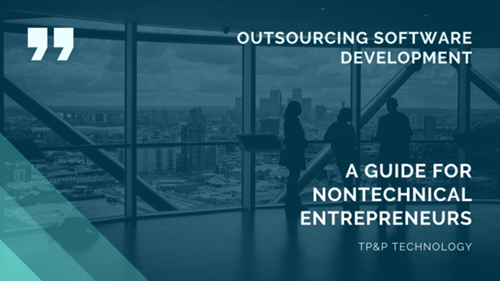
Outsourcing Software Development: A Guide for Nontechnical Entrepreneurs
The global demand for IT talents and software engineering is increasing and growing stronger than ever, especially when it comes to skilled engineering for innovative technologies such as Blockchain and Machine Learning. In fact, according to a report by industryresearch.biz, the global software engineering market is projected to grow approximately USD 37.4 Billion by 2022, at an approx. CAGR of 11.72% between 2016 and 2022.
And, such statistics showing strong demand hints at a difficulty in hiring skilled software developers in the local market. In recent years, many business organizations turn to Software outsourcing in order to address the problem of shortage in IT talents. However, if your business is not in the IT industry, it could be difficult to hire a reliable software outsourcing company or a freelance team worth contracting.
So, the question is what should you do to effectively hire the right software outsourcing company? Especially if you are a non-technical Entrepreneurs.

In this article, we outline a number of key steps needed to help you search for the right offshore software development outsourcing company.
Step 1: Look in-house
For starters, you should try to look in-house first to see if there’s someone with technical capability who can help walk you through the basics of your software project requirements.
It could be the IT manager or tech person who’s in charge of IT within your organization. Not having an idea about what you need and want to do is a recipe for disaster.
Talk to them about what your software idea is and how your vision looks like as well as how it works for the target audience.
It’s likely they’ll be able to help explain and walk you through the technical requirements. In case there’s no technical person you know available to help, you can still ask the potential outsourcing vendors for recommendations on the technical aspects of your project. And the good news is many, or some of them could offer to do this for free or at a minimal fee.
Step 2: Hiring Local Candidates vs. Offshore Outsourcing
Once you have a clear idea and vision about your project development goals, then it’s time to look for software outsourcing companies or freelance software developers who have the skills and experience needed to bring your software idea to life.
IT business directories such as Clutch, GoodFirms, and Upwork are good places to locate and short-list your potential offshore software company and talented developers.
In most cases, outsourcing to an offshore software company is usually a lot less expensive than hiring local or outsourcing on-shore.
In return, the geographical and time-zone distance may require you to put more effort into communicating and project management. However, the cost-effectiveness factor together with similar quality standards will make offshore outsourcing all worthwhile.
Step 3: Conduct Interviews and/or On-site visit
After having a short-list of potential candidates or outsourcing vendors for your project, then it’s time to talk to them to find out the one whose skills are the best fit for your project. The best way to do so is to conduct face-to-face interviews or video conferencing via the internet.
At this step, you may want to ask the in-house technical person or friend who works in IT for help, asking in-depth technical questions to verify the candidates’ expertise and skills needed for your project.
Other than asking about their technical skills, qualifications, and experience working on similar projects like yours, it’s also important to find out whether their personality is a good fit for you. This helps with communication which is crucial for moving the project forward.
Additionally, if you decide to go for offshore software outsourcing, then conducting an on-site visit might also be necessary, especially in situations of long-term outsourcing partnership where you need to find out about their team capacity and other much-needed information.
Step 4: Check references and reviews
The process of asking for references or reviews from past customers is to ensure that the freelancer or software vendor is credible and can be entrusted to work on your project. And, even if the developers you interviewed are qualified, it’s still essential to carry out this process. In particular, ask important questions about:
- Portfolio and case study of project similar to yours.
- What are the pricing and/or engagement models?
- Flexibility in changing the scope of work in the latter stages of the project.
- What are the reviews and/or testimonials from previous clients?
If necessary, you can ask to get in touch with past clients of the potential vendor or freelancers and ask them about the experience working together.
Of course, not all clients are easy to work with, but speaking to them will allow you to have a basic idea about what it’s like working with a freelancer or Software Company.
Common mistakes in outsourcing software development
It’s common for a nontechnical person who's so engaged and excited about their project to want to hit the ground running and focus their engineer search on cost.
One of the biggest mistakes you can make, however, is comparing freelancers or agencies based solely on their fixed project price quote or what they charge per hour.
One of the most common mistakes that nontechnical entrepreneurs encounter is that they’d rather focus on development cost than other aspects such as quality.
There are a number of pricing models to choose from, and sometimes, choosing candidates based solely on their fixed hourly rate could be entirely a wrong decision. Choosing the cheapest provider may end up costing you more in the later stage.
Depend on project scope and specific requirements, there should be a balanced mix of quality, price, and particular business needs.
Conclusion
When considering hiring software developers or development agency, it’s always important to plan ahead and conduct necessary interviews as well as verification by checking reviews and examine their portfolio and past projects.
Additionally, take into account the pricing model, development methodology, and their communication style. Ask to interview the team members including the project manager and technical leads who are going to work directly on your project.
More importantly, as a non-technical entrepreneur, you should ask around your professional and social network for help and recommendation on the technical aspects of your software project.



